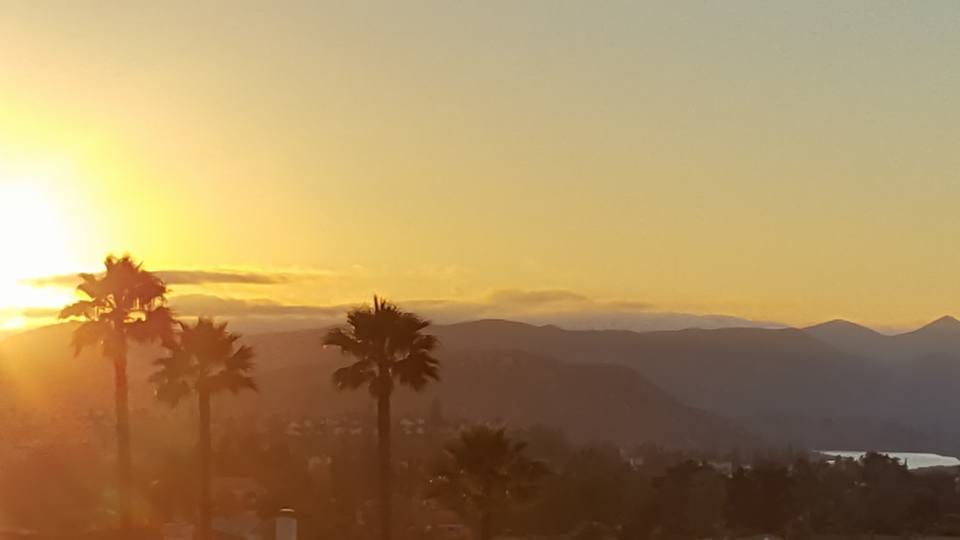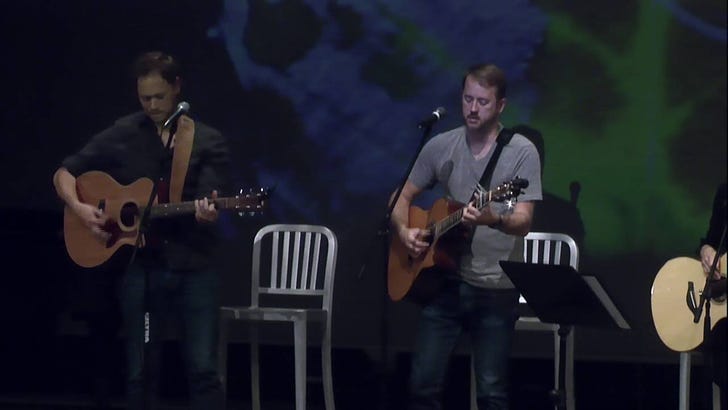I have been blessed, and sometimes cursed, to hear thousands of sermons in my life. I especially admire the Tony Campolo classic, “It’s Friday, But Sunday’s Comin’!” It was nearly an hour of wide-ranging spiritual dynamite. But if you know enough of the Christian tradition to recall what happened on Good Friday and Easter, the title gives away the key point.
Andrew Peterson gets to the heart of the matter.
My daughter and I put the seeds in the dirt
And every day now we've been watching the earth
For a sign that this death will give way to a birth
And the rain keeps falling
We’re all broken in one way or another. Today, the whole world is obviously and badly broken. It’s Friday and we’re waiting, hoping — longing — for Sunday.
When what we’re longing for doesn’t happen as quickly as we want or in the way we want, it can be easy to lose faith, to lose hope.
My lovely bride and I live at the top of a hill, which means that our regular Lenten walks end with a steep incline, breathing hard, and missing the view.

It feels like the whole world is trying to climb Mt. Everest today, freezing, five miles high, panting for air, and out of oxygen. It’s Friday. An exceedingly difficult Friday. It’s tough to keep Sunday in focus. But it’s comin’.
If you like TBL, please subscribe and share it using the buttons below.
Thanks for stopping by.
An Empathetic Lack of Empathy
Many of us have at least a passing knowledge of behavioral finance and its lead actor, confirmation bias, whereby we see what we want to see, accept those desires as truth, and act accordingly. Confirmation bias explains why, for example, the average man claims to have slept with 14 women while the average woman says she has slept with seven men. As Annie Duke says, we’re built for false positives.*
We quite naturally try to jam facts into our preconceived notions and commitments or simply miscomprehend reality such that we accept a view, no matter how implausible, that sees a different (“alternative”) set of alleged facts, “facts” that are used to support what we already believe. So when we grab a glass of what we think is apple juice, take a sip, and find out it’s really ginger ale, we react with disgust, even when we love ginger ale.
This weakness is mostly opaque to us. It leaves no cognitive trace. On our better days, we might grudgingly concede that we hold views that are wrong. The problem is with providing current examples.
That reality is bias blindness, our inability or unwillingness, even if and when we see it in others, to see the biases that beset us. As Jesus said: “It’s easy to see a smudge on your neighbor’s face and be oblivious to the ugly sneer on your own.”
A modernization of Jane Austen’s Emma, wherein the heroine spends the entire movie trying to help others who don’t have a clue, oblivious to being “Clueless” herself, provides a good example.
We’re often wrong but never in doubt.
Daniel Kahneman is the world’s leading expert on human error. I once asked him what he thought we could do to combat the biases that so routinely beset us. His answer began with a grim quip: “Not much.”
He’s not wrong, really. Mitigating our biases is a very difficult business.**
In further response to my question, Kahneman offered a practical idea. He suggested that our best chance of overcoming at least some of our inherent bias is for us to ask the best and smartest people we know to tear our ideas apart. In other words, the best advice is to “[s]low down, sleep on it, and ask your most brutal and least empathetic close friends for their advice.”
We need a directed and emphatic lack of empathy.
I’ve tried to take that suggestion to heart but it isn’t easy, although a good marriage provides a helpful start.
Humans are innately tribal. That at least partly explains why politics and Twitter are so nasty and partisan. We group like-to-like instinctively. That’s why friendships with people outside our normal affiliations are so valuable.
I cherish my relationships with people whose views on a wide variety of issues and subjects are utterly antithetical to mine. Those relationships – and the arguments they induce – improve and impact me tremendously.
What’s more, those relationships are crucial to demonstrating, on a daily basis, that people who disagree with me – strongly! – needn’t be stupid, delusional, or evil (in point of fact, they’re quite wonderful). The way we readily presume the inhumanity of our opponents is a constant threat to our culture and to a well-functioning society, especially in these polarized times.
I am eternally grateful for friends willing to tell me – and show me – that I am regularly and routinely full of it (you know who you are).
I’ll keep trying to return the favor.
_______________
* That 70s Show – from which the video clip is taken – is set in a mythical Wisconsin community. However, its co-creator, Mark Brazill, grew up in the small town bordering mine and littered the show with references to many places in and around my hometown in the 1970s, like “The Hub.”
** Approaches for mitigating bias include the use of science, which is specifically designed to reduce error; applying a diversity of approaches, ideas, and information sources; using what Harvard Medical School’s Atul Gawande describes as “the power of negative thinking” or “proof negative”; implementing what Michael Mauboussin calls the “outside view”; the use of a “premortem”; employing empowered teams (“extreme ownership”), “adversarial collaboration,” and accountability; and looking for “skin in the game.”
Duly Noted
Where Your Treasure Is
Brian Portnoy has a wonderful Twitter thread about finding meaning, beyond just happiness, in difficult times. I encourage you to read and apply it. Obviously, we need it.

Historically, religion and philosophy have been the endeavors by which meaning is considered. For example, Christianity has long posited that love is the most important thing. Scientific research now agrees. However, data suggested we were already not doing as much philosophical and religious thinking as we used to before the current crisis. That we seem to be doing even less of that while “sheltering in place,” as shown in the chart above, is an indictment of religion as practiced today and of ourselves.
It isn’t easy to follow Brian’s advice – information is cheap and meaning is expensive, after all – but he’s right. I like binging Friends reruns for the umpteenth time while spread out on the couch checking whether anyone has posted a new meme as much as anyone, but we ought to be careful to focus some real time and effort while quarantined on what is most important to us and how to make our lives more meaningful.
I mean it.
Totally Worth It
Joan Baez sings “Hello There” to honor John Prine, who has since died from COVID-19 infection.
What follows are some recent stories I found interesting, noteworthy, important, fun, or just plain weird.
Here is a great idea from Bob Driscoll for helping small businesses. Michael Lewis on quarantine life. Stranded in paradise. This is a bad guy. Waffle House started peddling its signature waffle mix and sold out in four hours. A story worth reading about Kobe Bryant, 9.11, memory, and friendship.
Mixed Media: Hamilton original cast via Zoom (video). Live music is now more intimate and perhaps more important than ever. Lockdown living. The best photos of the year so far. Photographers stuck inside who snapped. Kiara, the volleyball dog (video). A 42,000-piece puzzle in less than 3 minutes (video). Vulture asked creators and writers of popular shows to write a synopsis of what a COVID-19-related episode might look like. Japan’s Mt. Sakurajima erupts (video). A safari of short-form nature programming. Play-by-play of almost anything (video).
The Israel Philharmonic provided a socially distanced Passover chag sameach.
Update
Last week, I wrote about our world’s inherent uncertainty. New research published Tuesday makes the same point and suggests we can “handle the truth” of that, Jack Nicholson (and Aaron Sorkin) notwithstanding.
Benediction
“Touch has a memory,” wrote Keats. We all feel entombed this Good Friday, perhaps not alone but lonely and recalling the touch of those we cannot be with in the flesh these days.


It’s surely Friday.
Since I gave Andrew Peterson the first (musical) word, it seems appropriate to give him the last word, too. Consider it an Easter benediction special.
Because Sunday’s comin’.
I wish all who celebrate a blessed Easter. And I wish all of you a wonderful day with your families and friends, whatever means you might use to accomplish that. It may be Friday and a very dark one at that, but Sunday’s comin’.
I would be pleased to hear your questions, comments, concerns, criticisms, suggestions, and complaints via email to rpseawright [at] gmail [dot] com or on Twitter (@rpseawright). Don’t forget to subscribe and share.
Issue 8 (April 10, 2020)





